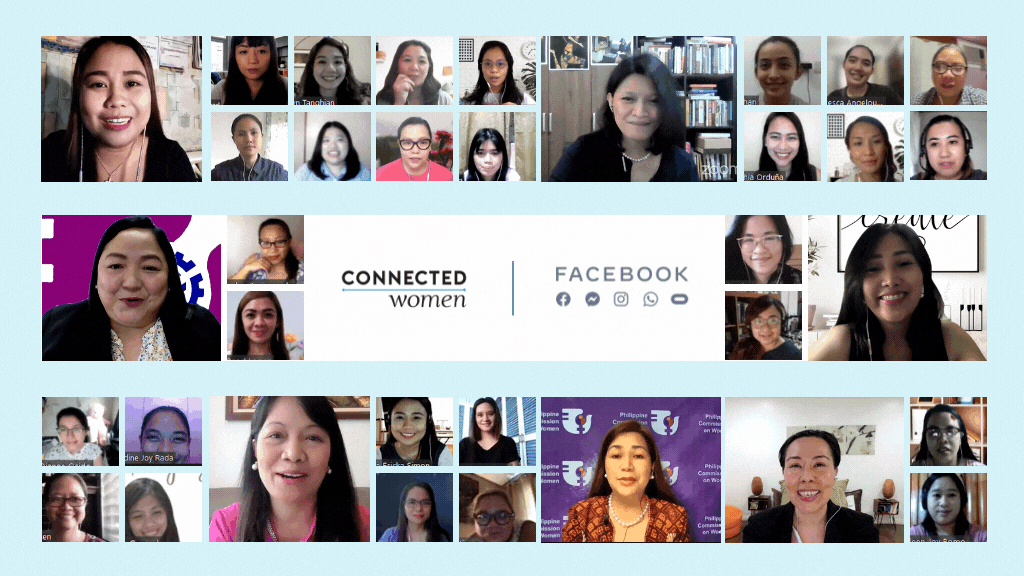Connected Women and Facebook Launch Social Media Marketing Professional Certificate Program
 Contributed by
Sasha Lim Uy Mariposa
August 31, 2021
Contributed by
Sasha Lim Uy Mariposa
August 31, 2021

Award-winning social impact startup Connected Women, together with Facebook’s e-learning platform Blueprint, has launched a social media marketing scholarship program via Coursera. The course aims to equip members of underserved or vulnerable sectors of society with the proper tools to join the ever-growing digital workforce.
This project is only the latest in Connected Women’s series of programs to empower women, especially for the digital economy. The pilot run for the Blueprint-Coursera course seeks to teach 300 learners—a mix of women, out-of-school youth, and overseas Filipino workers. The first 100 women scholars have already been shortlisted.
The program offers hands-on training through 100 hours of project-based learning. It will cover general marketing skills, applied Facebook tools, a run-through of various social media platforms, as well as the soft skills necessary to thrive in this industry. Participants will receive a certificate at the end of the course.
“We are honored to have Connected Women as our first partner in the Philippines to launch the Facebook Social Media Marketing Professional Certificate Program,” said Michelle Chan, Facebook Blueprint Education Program Trainer. “It is particularly meaningful to be able to help nurture and empower women in the community through education. We wish our learners all the best in their learning journey!”
The rise of digital marketing
The Social Media Marketing Certificate Course has come at the right time. LinkedIn data from 2020 revealed a 52% rise in digital marketing jobs in the United Kingdom alone. Moreover, out of the 10 rapidly in-demand skills in today’s economy, eight are related to the digital and data industry—with paid social media increasing by 116%.
“Social media serves as an accelerator for overall enterprise growth. It helps businesses to communicate their products and services to their consumers better and in turn, brings positive effects on business to consumer growth,” said Sandra Montano, chair of the Philippine Commission on Women, during the launch.
But while the numbers seem promising, technology remains inaccessible to the majority of Filipinos, especially for women whose opportunities are limited by their traditional, home-based roles. Initiatives like this collaboration between Connected Women and Facebook are lowering the drawbridge to close those gaps.
“With the ongoing digital transformation, it is important to note that scholarship programs which aim to educate the underserved and vulnerable sectors are vital to the goal of inclusivity and development,” continued Montano.
According to Angelica Gonzales, chief of TESDA Women’s Center, the scholarship program is a defining moment to women, out-of-school-youth, and Overseas Filipino Workers:
“Our Juanas are very fortunate to have organizations like Connected Women, Facebook Philippines, and TESDA Women’s Center, with the full support of the Philippine Commission on Women and ICT Industry Development Bureau (DICT) for bringing us programs to up-skill or re-skill Juanas so that they will be empowered and be productive at the comfort of their homes,” she said.
She added that research by the World Bank, the United Nations, and the Global Entrepreneurship Monitor shows how women are the real drivers of the economy.
The digital Philippines
In June 2021, the Department of Information and Communications Technology (DICT) introduced its new CHIP framework. Meaning Connect, Harness, Innovate, and Protect, this initiative aims to kickstart the country’s digital transformation—planning everything from improving infrastructure for information communication technology to upskilling workers to the demands of the digital world.
According to DICT director Emmy Lou Delfin, Facebook Social Media Marketing Professional Certificate Program fits right in with this mission. “It creates an avenue for Filipino women to participate in the digital economy and help create more economic opportunities for people, especially women,” she explained, adding that despite still being considered vulnerable, women are becoming more empowered thanks to these concerted efforts.
While movements like Connected Women have pushed towards a wider, more inclusive door, the fact is, it’s still not big enough. Connected Women co-founder and CEO Gina Romero paints the current picture:
“Even in this day and age in 2021, women are less likely than men to have access to financial institutions or bank accounts. Most of the 3.9-billion people who are offline are in rural areas, they are poorer, less educated, and tend to be women or girls. Women are less likely to be entrepreneurs and face more disadvantages in starting a business. They are also constrained from achieving the highest positions in a company with only 5% of Fortune 500 CEOs being women.”
With the one hundred scholars from the first batch now part-way through the course, Connected Women supports the self-paced learning model with an active social learning group on Facebook. The scholars are able to share wins and challenges as well as stay-up-to-date by following the progress of fellow learners. They also have a monthly Kumastahan session held on Zoom and accountability groups to keep them motivated.
“(This program) gives me the confidence and inspiration to reach my personal goals: to have a good paying job, pay it forward and be able to help others. Thank you!” said Vina Canillas, one of the scholars.
As the need to transition to digital accelerates, there is hope — that it will speed up access to equal opportunities as well.










Sorry, the comment form is closed at this time.